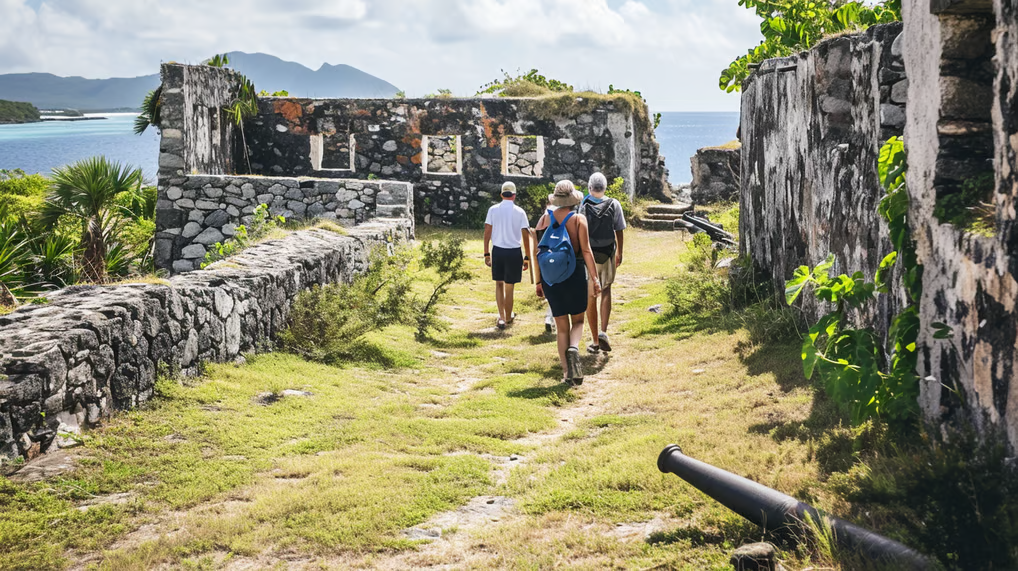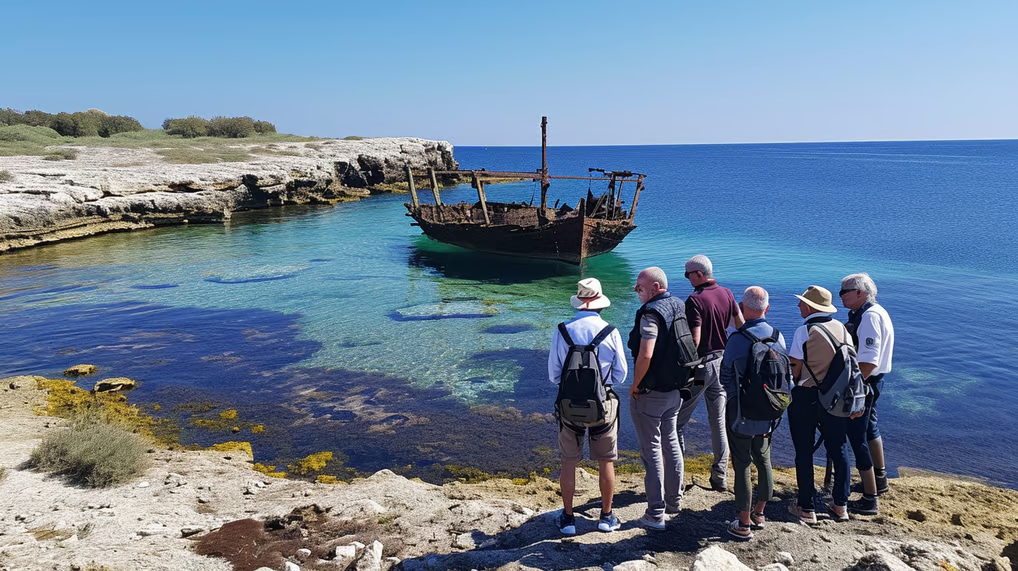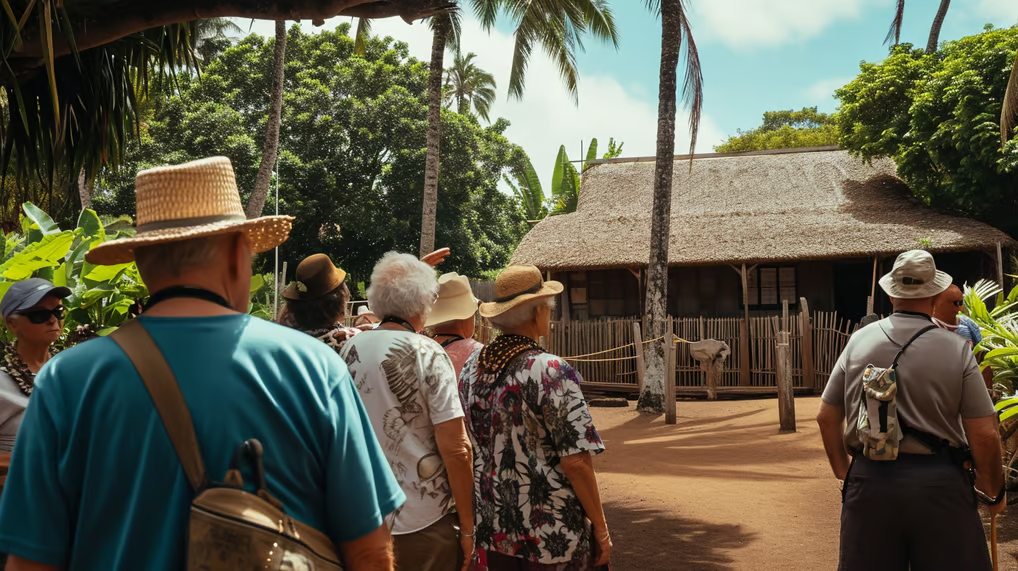Island Hopping for History Buffs: Tracing Civilization from One Archipelago to Another
Embark on a historical odyssey through island hopping, tracing the footprints of ancient civilizations from one archipelago to another, uncovering the rich, layered stories that shaped our world.

Are you a history enthusiast who loves traveling? If so, then island hopping may be the perfect adventure for you. Imagine exploring different archipelagos, unlocking the secrets of ancient civilizations, and witnessing the evolution of societies firsthand. From the Mediterranean to the Polynesian Triangle and the British Isles to the Caribbean, each archipelago has a unique story to tell. Join us on a journey as we trace civilization from one archipelago to another, unraveling the historical significance of these island groups.
Understanding the Concept of Island Hopping
Before we delve into the historical aspects, let's understand the concept of island hopping. It involves exploring multiple islands in a single trip, allowing you to experience the rich cultural diversity that develops within archipelagos. Island hopping offers a unique perspective on how civilizations thrive and adapt to their natural surroundings. By immersing yourself in the local culture, history, and traditions, you gain a deeper appreciation for the interconnectedness of different societies.
Imagine setting foot on a pristine white sandy beach, surrounded by crystal clear turquoise waters. The gentle breeze carries the scent of exotic flowers, while the sound of waves crashing against the shore creates a soothing melody. As you embark on your island hopping adventure, each island presents a new world to discover, with its own distinct charm and allure.
Picture yourself strolling through narrow cobblestone streets, lined with vibrant houses painted in shades of blue and white. The air is filled with the aroma of freshly baked pastries, and locals greet you with warm smiles. You immerse yourself in the local traditions, joining in on traditional dances and tasting authentic cuisine passed down through generations.
The Historical Significance of Island Hopping
Island hopping has played a crucial role in the development of civilizations throughout history. By traversing across islands, ancient seafaring communities were able to exchange knowledge, goods, and ideas. This constant cultural exchange fostered growth, leading to the rise of great civilizations.
Imagine sailing on a majestic wooden ship, navigating through treacherous waters to reach distant islands. The journey is not only a physical one but also a voyage of discovery and exploration. As you dock on each island, you witness the remnants of ancient civilizations that once thrived in these lands. Ruins of grand temples, intricate artwork, and artifacts tell stories of a bygone era.
On your island hopping adventure, you come across ancient trading posts, bustling marketplaces where merchants from different islands gather to exchange goods. The vibrant atmosphere is filled with the sounds of bartering and laughter, as people from diverse backgrounds come together to engage in commerce and cultural exchange.
The Role of Islands in the Evolution of Civilizations
Islands often provide a natural barrier, encouraging unique cultural development within their confines. The Mediterranean archipelago is a prime example of how islands have shaped civilizations. Let's set sail to the Greek islands, the birthplace of Western philosophy.
As you step foot on the Greek islands, you can't help but be awestruck by the ancient ruins that dot the landscape. The Acropolis of Athens stands majestically, a testament to the intellectual and artistic achievements of the ancient Greeks. Walking through the ruins, you can almost hear the echoes of philosophical debates and the footsteps of great thinkers like Socrates and Plato.
Island hopping in Greece allows you to witness the evolution of architecture and art styles as you move from one island to another. From the iconic white-washed buildings of Santorini to the medieval castles of Rhodes, each island showcases a unique blend of history and culture.
By exploring the Greek islands, you gain a deeper understanding of the interconnectedness of ancient civilizations. The exchange of ideas and knowledge between islands played a pivotal role in shaping the world as we know it today. From democracy to mathematics, philosophy to literature, the impact of these island civilizations can still be felt in our modern society.

The Mediterranean Archipelago: Cradle of Ancient Civilizations
Stepping foot on the Greek islands is like traveling back in time. From Athens to Santorini and Rhodes to Crete, each island has its own historical treasures waiting to be discovered.
The Greek islands not only offer breathtaking views of the Aegean Sea, but they also hold a rich and fascinating history. These islands were once home to some of the world's greatest minds, such as Socrates, Plato, and Aristotle. As you explore Athens' ancient ruins, you'll be awed by the monumental structures that have withstood the test of time.
Walking through the streets of Athens, you can almost hear the echoes of philosophical debates that took place thousands of years ago. The Acropolis, with its iconic Parthenon, stands as a testament to the intellectual achievements of ancient Greece. The intricate carvings and grandeur of this architectural marvel leave visitors in awe of the craftsmanship and ingenuity of the ancient Greeks.
Exploring the Greek Islands: Birthplace of Western Philosophy
But the Greek islands offer more than just ancient ruins. The picturesque island of Santorini, with its whitewashed buildings and blue-domed churches, is a sight to behold. As you stroll through the narrow streets of Oia, you'll be captivated by the stunning views of the caldera and the breathtaking sunsets that have inspired artists for centuries.
Rhodes, another jewel in the Greek archipelago, boasts a rich history that dates back to ancient times. The medieval city of Rhodes, a UNESCO World Heritage Site, is a maze of narrow streets and ancient walls. As you wander through its cobblestone alleys, you'll discover hidden squares, Byzantine churches, and Ottoman mosques, all testaments to the island's diverse cultural heritage.
Sicily and Sardinia: The Crossroads of Mediterranean Cultures
Moving westward, we reach Sicily and Sardinia, islands that have witnessed the convergence of various Mediterranean cultures. These islands have been shaped by the Phoenicians, Greeks, Romans, Arabs, and Normans, among others, leaving behind a rich tapestry of architectural styles and cultural traditions.
In Sicily, the Valley of the Temples in Agrigento is a UNESCO World Heritage Site that showcases the remains of ancient Greek temples. These majestic structures, dedicated to the gods and goddesses of Greek mythology, stand as a testament to the island's ancient past.
Sardinia, on the other hand, is known for its unique Nuragic civilization. The Nuraghe, ancient stone structures that dot the landscape, are a mystery that archaeologists are still unraveling. These megalithic towers, built by the Nuragic people thousands of years ago, are a testament to their advanced engineering skills and their complex society.
As you explore the Mediterranean archipelago, you'll find yourself immersed in a world of ancient civilizations. From the birthplace of Western philosophy in Greece to the crossroads of Mediterranean cultures in Sicily and Sardinia, each island holds a unique piece of history waiting to be discovered.
The Polynesian Triangle: A Journey through the Pacific
Leaving the Mediterranean behind, we set our sights on the vast expanse of the Pacific Ocean. The Polynesian Triangle, encompassing Hawaii, New Zealand, and Easter Island, offers a glimpse into the ancient Polynesian civilizations.
As we embark on our journey through the Polynesian Triangle, we are immediately captivated by the allure of Hawaii. Known for its breathtaking beauty, this archipelago not only boasts stunning landscapes but also holds a rich cultural heritage. The indigenous people of Hawaii, known as the Kanaka Maoli, have a deep connection to their ancient Polynesian roots. Through their language, hula dances, and traditional practices, they have preserved their cultural identity and kept their ancestral traditions alive.
Exploring the islands of Hawaii, we encounter sacred sites that hold great significance to the Kanaka Maoli. From the majestic Mauna Kea, the tallest volcano on the Big Island, to the historic Pu'uhonua o Honaunau, a place of refuge and spiritual sanctuary, each location tells a story of the ancient Polynesian settlers who first arrived on these shores.
Hawaii and its Ancient Polynesian Roots
Hawaii, known for its breathtaking beauty, also holds a rich cultural heritage. The indigenous people of Hawaii have passed down their traditions and stories through generations, connecting the present with its ancient Polynesian roots.
Immersing ourselves in the vibrant Hawaiian culture, we witness the mesmerizing performances of hula dancers, who gracefully tell stories through their movements. The hula, a traditional dance form, is not only a form of entertainment but also a way to honor the gods and ancestors. Each step, each gesture, carries the weight of centuries of tradition, reminding us of the deep connection between the people of Hawaii and their ancient Polynesian ancestors.
As we delve deeper into the history of Hawaii, we learn about the voyaging traditions of the Polynesians. The ancient Polynesians were skilled navigators who used the stars, currents, and natural signs to traverse the vast Pacific Ocean. Their remarkable seafaring abilities allowed them to explore and settle in the most remote corners of the Polynesian Triangle, including Hawaii. The legacy of their voyages is still celebrated today through events like the Hōkūleʻa, a traditional Polynesian voyaging canoe that has circumnavigated the globe, showcasing the enduring spirit of exploration and discovery.
Easter Island: The Mystery of the Moai Statues
The remote Easter Island brings us face to face with the enigmatic Moai statues. These monolithic figures, scattered across the island, offer evidence of a vibrant civilization that flourished against all odds.
Stepping foot on Easter Island, we are immediately struck by the sheer magnitude and mystery of the Moai statues. Carved from volcanic rock, these colossal figures stand as silent guardians of a bygone era. Each statue is a testament to the incredible craftsmanship and artistic prowess of the Rapa Nui people, the indigenous inhabitants of Easter Island.
As we explore the island, we unravel the secrets behind the construction and transportation of these massive stone statues. How were they carved with such precision? How were they transported across the island, sometimes over long distances? These questions continue to baffle archaeologists and historians, adding to the allure and intrigue of Easter Island.
Beyond the Moai statues, Easter Island offers a glimpse into the daily lives of the Rapa Nui people. We visit the ceremonial village of Orongo, perched on the edge of a volcanic crater, where the annual Birdman competition took place. This unique cultural event, which involved a daring race to collect the first egg of the season from a nearby islet, highlights the ingenuity and resilience of the Rapa Nui civilization.
As we conclude our journey through the Polynesian Triangle, we are left in awe of the ancient Polynesian civilizations that once thrived in these remote corners of the Pacific. Their legacy lives on through the traditions, stories, and archaeological wonders that continue to captivate and inspire us today.

The British Isles: A Tapestry of Historical Eras
From the Pacific, we make our way towards the British Isles, where a tapestry of historical eras awaits us. Here, the remnants of Celtic tribes and Viking invaders mingle with the stories of medieval knights and Renaissance artists.
The Celtic Heritage of Ireland and Scotland
Ireland and Scotland, with their stunning landscapes and ancient monuments, are steeped in Celtic heritage. From the mysterious Stonehenge to the vibrant city of Dublin, there is much to uncover on these captivating islands.
The Viking Influence on the Shetland and Orkney Islands
Heading north, we arrive at the Shetland and Orkney Islands, where the vestiges of Viking influence are evident in the architecture, language, and traditions. Explore the Viking heritage through Norse sagas and ancient settlements.
The Caribbean Archipelago: A Mosaic of Colonial Histories
Finally, we embark on a journey to the Caribbean archipelago, a place where the legacy of European colonialism blends with the vibrant cultures of indigenous peoples.
The Indigenous Cultures of the Greater Antilles
Discover the rich blend of indigenous cultures in the Greater Antilles. From the Taino in Puerto Rico to the Arawak in Jamaica, these islands are a testament to the resilience and diversity of the original inhabitants.
The Lesser Antilles: A Legacy of European Colonization
The Lesser Antilles tell a story of European colonization, with influences from the Spanish, French, Dutch, and British empires. Each island retains its unique character, shaped by centuries of history and cultural exchange.
As we conclude this remarkable journey through archipelagos, one thing becomes evident - islands are not just picturesque retreats, but living museums that hold the key to understanding our shared heritage. So, grab your backpack and set sail on an island-hopping adventure to uncover the hidden wonders of civilizations past.
Join us on this historical voyage today and become an explorer of civilizations!